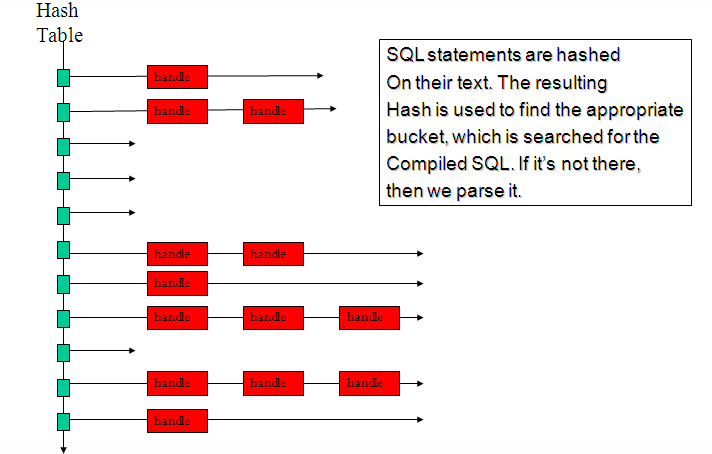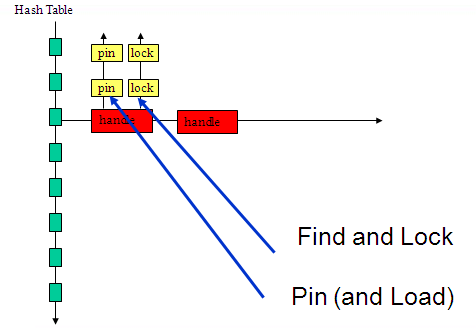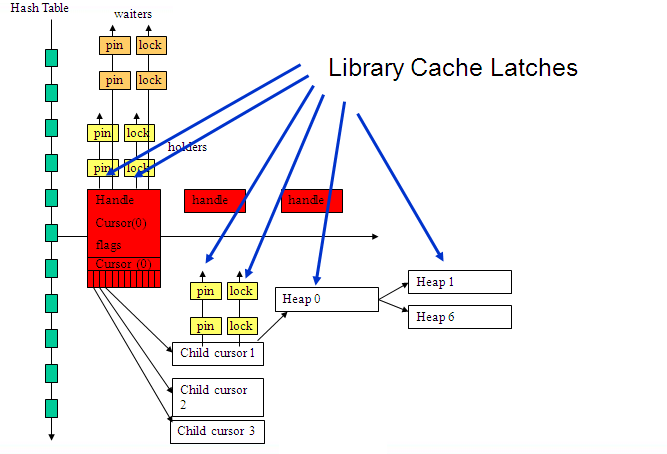Library cache
asdf
Contents
Library cache latches
Protects changes in Library Cache Library Locks are not atomic Thus need library cache latch Broken out into
- library cache pin allocation
- library cache lock allocation
- library cache lock
- library cache
- library cache pin
- library cache load lock
causes
- Excessive Hard Parsing
- Not Sharing SQL – use of Literal Values
- Shared Pool too small
- Too many invalidations
- Excessive Soft Parsing
- Excessive Hard Parsing
Hard Parsing
- Not Sharing SQL
- Bind Variables
- Select * from dual where dummy = :var;
- Cursor_Sharing
- Cursor_sharing = Force
- Oracle replaces variables with bind variables
- Defaults to Exact
- select plan_hash_value,count(plan_hash_value)
- from v$sql
- group by plan_hash_value,
- order by count(plan_hash_value)
SQL> @dups
| PLAN_HASH_VALUE | CNT |
| 272002086 | 520 |
- select sql_text
- from v$sql
- where
- plan_hash_value = 272002086
- and rownum < 10;
- SQL_TEXT
- -----------------------------------------------
- SELECT * FROM dual WHERE dummy=-634891633
- SELECT * FROM dual WHERE dummy=1987751014
- SELECT * FROM dual WHERE dummy=25965276
- SELECT * FROM dual WHERE dummy=32449789
- SELECT * FROM dual WHERE dummy=-364632215
- SELECT * FROM dual WHERE dummy=-34273351
- SELECT * FROM dual WHERE dummy=-699712683
- SELECT * FROM dual WHERE dummy=1752437199
- SELECT * FROM dual WHERE dummy=-1081512404
Shard pool too small
- select namespace, reloads from v$librarycache;
| NAMESPACE | RELOADS |
| SQL AREA | 367 |
| TABLE/PROCEDURE | 592 |
- Reloads means Cursor heaps were kicked out implying shared_pool too small
Invalidations
- select namespace,
- invalidations
- from v$librarycache;
| NAMESPACE | INVALIDATIONS |
| SQL AREA | 6065 |
Changes in dependent objects invalidate cursor
- FOR i IN 1..3000 LOOP
- l_cursor:=dbms_sql.open_cursor;
- dbms_sql.parse(l_cursor,
- 'SELECT * FROM toto',dbms_sql.native);
- execute immediate 'analyze table toto compute statistics';
- dbms_sql.close_cursor(l_cursor);
- END LOOP;
Soft Parsing
- FOR i IN 1..30000 LOOP
- l_cursor:=dbms_sql.open_cursor;
- dbms_sql.parse(l_cursor,'SELECT * FROM dual’,dbms_sql.native);
- dbms_sql.close_cursor(l_cursor);
- END LOOP;
Session_cached_cursors=0
| Latch | Gets |
| library cache lock | 120,028 |
| library cache | 180,074 |
| library cache pin | 60,048 |
Session_cached_cursors=20
| library cache lock | 4 |
| library cache | 60,061 |
| library cache pin | 60,048 |
- FOR i IN 1..30000 LOOP
- Frc:=dbms_sql.execute(l_cursor);
- FIF DBMS_SQL.FETCH_ROWS (l_cursor) < 0 THEN
- FDBMS_SQL.COLUMN_VALUE (l_cursor, 1, cnt);
- Fend if;
- FEnd loop;
Cursor_space_for_time=false
| Latch | Gets |
| library cache lock | 35 |
| library cache | 60,096 |
| library cache pin | 60,044 |
Cursor_space_for_time=true
| library cache lock | 30 |
| library cache | 85 |
| library cache pin | 42 |
latch: library cache
library cache latch - usually indicates too much hard parsing
latch: library cache lock
latch: library cache pin
Library Cache Locks and Pins
Contention when Sessions try to
- Load/compile same SQL
- Compile package others are running
Locks and Pins are usually in share mode unless modifications are being made
Object dependency
- lock in Null
Cursor execution
- lock in null
- Pin in Share
Cursor compilation
- Lock exclusive
- Pin exclusive
library cache load lock
- multiple users waiting for same SQL to be compiled
library cache lock
user trying to compile code and can't access it in exclusive access
library cache pin
asdf
Find the blocker
- select
- waiter.sid waiter,
- waiter.event wevent,
- to_char(blocker_event.sid)||','||to_char(blocker_session.serial#) blocker,
- substr(decode(blocker_event.wait_time,
- 0, blocker_event.event,
- 'ON CPU'),1,30) bevent
- from
- x$kglpn p,
- gv$session blocker_session,
- gv$session_wait waiter,
- gv$session_wait blocker_event
- where
- p.kglpnuse=blocker_session.saddr
- and p.kglpnhdl=waiter.p1raw
- and waiter.event in ( 'library cache pin' ,
- 'library cache lock' ,
- 'library cache load lock')
- and blocker_event.sid=blocker_session.sid
- and waiter.sid != blocker_event.sid
- order by
- waiter.p1raw,waiter.sid;
result
| WAITER | WLOCKP1 | WEVENT | BLOCKER | BEVENT |
| 129 | 00000003B76AB620 | library cache pin | 135,15534 | PL/SQL lock timer |
asdf
Mutexes in Library Cache
10gR2 new library cache latch mechanism that replace latches and takes less memory From Tanel Pode, On 32bit linux installation a mutex was 28 bytes in size, regular latch structure was 110 bytes. Takes less instructions to mutex get is about 30-35 instructions latch get is 150-200 instructions Less contention than latches, because there can be more mutexes Mutexes stored in each child cursor Turn off with _kks_use_mutex_pin=false , unsupported
Instead of "library cache pin" mutexes are used under "cursor: pin X", "cursor: pin S" and "cursor: pin S wait on X" The field blocking_session in v$session is not filled in when there are mutex waits on 10.2 at least. cursor: pin ( S, S wait on X) means re-executions of the same cursors Instead of latching for a pin on execute we use a shared mutex If can’t get the mutex spin. Turning off should increase ‘library cache pin’ events _kks_use_mutex_pin=false Contention should be worse for latches because latches cover multiple objects cursor_space_for_time not needed if mutexes are used
cursor: pin S
- Pin cursor for execute, and cursor is currently being examined by another session
- "A session waits on this event when it wants to update a shared mutex pin and another session is currently in the process of updating a shared mutex pin for the same cursor object. This wait event should rarely be seen because a shared mutex pin update is very fast.
- Wait Time: Microseconds
| Parameter | Description |
| P1 | Hash value of cursor |
| P2 | Mutex value (top 2 bytes contains SID holding mutex in exclusive mode, and bottom two bytes usually hold the value 0)
|
| P3 | Mutex where (an internal code locator) OR'd with Mutex Sleeps |
cursor: pin X
- When attempting to rebuild a cursor. This event should not be seen typically, because if a cursor is currently being used, and it needs to be rebuilt, another cursor will be create
- "A session waits on this event when it is requesting an exclusive mutex pin for a cursor object and it must wait because the resource is busy. The mutex pin for a cursor object can be busy either because a session is already holding it exclusive, or there are one or more sessions which are holding shared mutex pin(s). The exclusive waiter must wait until all holders of the pin for that cursor object have released it, before it can be granted.
Wait Time:
| Parameter | Description |
| P1 | Hash value of cursor |
| P2 | Mutex value (top 2 bytes contains SID holding mutex in exclusive mode, and bottom two bytes usually hold the value 0) |
| P3 | Mutex where (an internal code locator) OR'd with Mutex Sleeps |
cursor: mutex S
- examining a parent (when looking for a cursor to execute)
- examining a cursor’s statistics (usually querying v$sqlstats )
- "A session waits on this event when it is requesting a mutex in shared mode, when another session is currently holding a this mutex in exclusive mode on the same cursor object."
| Parameter | Description |
| P1 | Hash value of cursor |
| P2 | Mutex value (top 2 bytes contain SID holding mutex in exclusive mode, and bottom two bytes usually hold the value 0) |
| P3 | Mutex where (an internal code locator) OR'd with Mutex Sleeps |
cursor: mutex X
- building a new cursor under a parent
- building and updating cursor-related statistics
- capture SQL bind data
- "The session requests the mutex for a cursor object in exclusive mode, and it must wait because the resource is busy. The mutex is busy because either the mutex is being held in exclusive mode by another session or the mutex is being held shared by one or more sessions. The existing mutex holder(s) must release the mutex before the mutex can be granted exclusively.
| Parameter | Description |
| P1 | Hash value of cursor |
| P2 | Mutex value (top 2 bytes contain SID holding mutex in exclusive mode, and bottom two bytes usually hold the value 0) |
| P3 | Mutex where (an internal code locator) OR'd with Mutex Sleeps |
cursor: pin S wait on X
- Pinning a cursor for execute
- Bug on 10.2.0.3 typically with DBMS_STATS
- Metalink Note:401435.1, Note:5907779.8, bug 5907779
- "A session waits for this event when it is requesting a shared mutex pin and another session is holding an exclusive mutex pin on the same cursor object.
Wait Time: Microseconds
| Parameter | Description |
| P1 | Hash value of cursor |
| P2 | Mutex value (top 2 bytes contains SID holding mutex in exclusive mode, and bottom two bytes usually hold the value 0) |
| P3 | Mutex where (an internal code locator) OR'd with Mutex Sleep |
- From Connie Green (have to check this reference):
- "An example of the ‘cursor: pin S wait on X’ event.
- If a session is waiting on the wait event ‘cursor: pin S wait on X’, the session is most likely trying to execute a cursor (pin S), and must wait as another session (who is most likely parsing the cursor) has it pinned X (wait on X)
- v$session.p1 can be used to compare with v$mutex_sleep_history.mutex_identifier
- Example v$session data (64 bit platform), from an instance where the mutex holder was hung due to a bug not related to mutexes, causing requestors to back up behind the holder:
- select p1, p2raw, count(*)
- from v$session
- where event = ‘cursor: pin S wait on X’
- and wait_time = 0
- group by p1, p2;
| P1 | P2RAW | COUNT(*) |
| 2700259466 | 0000139700000000 | 9 |
| <Mutex Id> | < SId> | <RefCnt> |
- As you can see, 9 sessions were waiting for Session Id 0x1397, which was holding exclusive the Mutex with the Id 2700259466. The Ref Count is zero, as we would expect. The 9 sessions are waiting to execute the cursor protected by mutex Id 2700259466. If latches had been in use instead of mutexes, it is likely this bug would have had a greater impact, as there would have been many more requestors backed up on a latch which protects many objects, than a mutex that in this case protects just one cursor.
- To find the blocking session, use the top bytes of v$session.p2raw e.g. the top bytes of p2raw is the blocker 0x00001397 which when converted to decimal, is session Id 5015.
Row Cache
latch: row cache objects
row cache lock
- Depends on which cache the lock is happening on
- :select
- : ash.session_id sid,
- ash.blocking_session bsid,
- nvl(o.object_name,to_char(CURRENT_OBJ#)) obj,
- o.object_type otype,
- CURRENT_FILE# filen,
- CURRENT_BLOCK# blockn,
- ash.SQL_ID,
- nvl(rc.name,to_char(ash.p3)) row_cache
- :from v$active_session_history ash,
- ( select cache#, parameter name from v$rowcache ) rc,
- all_objects o
- :where event='row cache lock'
- and rc.cache#(+)=ash.p1
- and o.object_id (+)= ash.CURRENT_OBJ#
- and ash.session_state='WAITING'
- and ash.sample_time > sysdate - &minutes/(60*24)
- :Order by sample_time
| SID | BSID | OBJ | OTYPE | FILEN | BLOCKN | SQL_ID | ROW_CACHE |
| 143 | 131 | -1 | 0 | 0 | 41y8w0sfqb61m | dc_sequences | |
| 134 | 131 | -1 | 0 | 0 | dc_sequences | ||
| 151 | -1 | 0 | 0 | dc_sequences | |||
| 134 | 151 | -1 | 0 | 0 | dc_sequences | ||
| 131 | 151 | -1 | 0 | 0 | dc_sequences | ||
| 151 | -1 | 0 | 0 | dc_sequences |
- select cache#, parameter name from v$rowcache order by cache#;
| CACHE# | NAME |
| 0 | dc_tablespaces
|
| 1 | dc_free_extents
|
| 2 | dc_segments
|
| 3 | dc_rollback_segments
|
| 4 | dc_used_extents
|
| 5 | dc_tablespace_quotas
|
| 6 | dc_files
|
| 7 | dc_users
|
| 7 | dc_users
|
| 7 | dc_users
|
| 7 | dc_users
|
| 8 | dc_objects
|
| 8 | dc_object_grants
|
| 9 | dc_qmc_cache_entries
|
| 10 | dc_usernames
|
| 11 | dc_object_ids
|
| 12 | dc_constraints
|
| 13 | dc_sequences
|
| 14 | dc_profiles
|
| 15 | dc_database_links
|
| 16 | dc_histogram_data
|
| 16 | dc_histogram_data
|
| 16 | dc_histogram_defs
|
| 17 | dc_global_oids
|
| 18 | dc_outlines
|
| 19 | dc_table_scns
|
| 19 | dc_partition_scns
|
| 20 | rule_info
|
| 21 | rule_or_piece
|
| 21 | rule_fast_operators
|
| 22 | dc_awr_control
|
| 23 | dc_qmc_ldap_cache_entries
|
| 24 | outstanding_alerts
|
| 25 | dc_hintsets
|
| 26 | global database name
|
| 27 | qmtmrcin_cache_entries
|
| 28 | qmtmrctn_cache_entries
|
| 29 | qmtmrcip_cache_entries
|
| 30 | qmtmrctp_cache_entries
|
| 31 | qmtmrciq_cache_entries
|
| 32 | qmtmrctq_cache_entries
|
| 33 | kqlsubheap_object |
- Example 1) dropping an object while another session tries to get information on the object gets dc_object_ids lock waits
- Example 2) having the sequence cache too small and a lot of contention on sequences gets dc_sequences lock waits if on Sequence cache, then find the sequence and increase number cached


